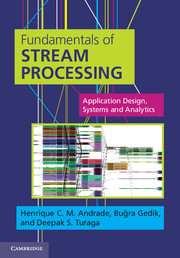Book contents
- Frontmatter
- Dedication
- Contents
- Preface
- Foreword
- Acknowledgements
- List of acronyms
- Part 1 Fundamentals
- 1 What brought us here?
- 2 Introduction to stream processing
- Part II Application development
- Part III System architecture
- Part IV Application design and analytics
- Part V Case studies
- Part VI Closing notes
- Keywords and identifiers index
- Index
- References
1 - What brought us here?
from Part 1 - Fundamentals
Published online by Cambridge University Press: 05 March 2014
- Frontmatter
- Dedication
- Contents
- Preface
- Foreword
- Acknowledgements
- List of acronyms
- Part 1 Fundamentals
- 1 What brought us here?
- 2 Introduction to stream processing
- Part II Application development
- Part III System architecture
- Part IV Application design and analytics
- Part V Case studies
- Part VI Closing notes
- Keywords and identifiers index
- Index
- References
Summary
Overview
The world has become information-driven, with many facets of business and government being fully automated and their systems being instrumented and interconnected. On the one hand, private and public organizations have been investing heavily in deploying sensors and infrastructure to collect readings from these sensors, on a continuous basis. On the other hand, the need to monitor and act on information from the sensors in the field to drive rapid decisions, to tweak production processes, to tweak logistics choices, and, ultimately, to better monitor and manage physical systems, is now fundamental to many organizations.
The emergence of stream processing was driven by increasingly stringent data management, processing, and analysis needs from business and scientific applications, coupled with the confluence of two major technological and scientific shifts: first, the advances in software and hardware technologies for database, data management, and distributed systems, and, second, the advances in supporting techniques in signal processing, statistics, data mining, and in optimization theory.
In Section 1.2, we will look more deeply into the data processing requirements that led to the design of stream processing systems and applications. In Section 1.3, we will trace the roots of the theoretical and engineering underpinnings that enabled these applications, as well as the middleware supporting them. While providing this historical perspective, we will illustrate how stream processing uses and extends these fundamental building blocks.
Information
- Type
- Chapter
- Information
- Fundamentals of Stream ProcessingApplication Design, Systems, and Analytics, pp. 3 - 32Publisher: Cambridge University PressPrint publication year: 2014
